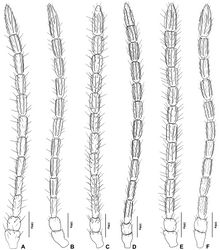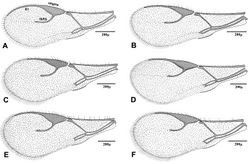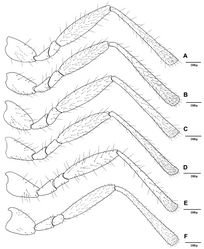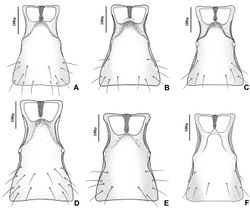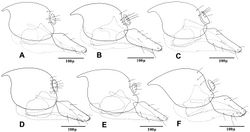Adialytus veronicaecola
| Notice: | This page is derived from the original publication listed below, whose author(s) should always be credited. Further contributors may edit and improve the content of this page and, consequently, need to be credited as well (see page history). Any assessment of factual correctness requires a careful review of the original article as well as of subsequent contributions.
If you are uncertain whether your planned contribution is correct or not, we suggest that you use the associated discussion page instead of editing the page directly. This page should be cited as follows (rationale):
Citation formats to copy and paste
BibTeX: @article{Rakhshani2012ZooKeys221, RIS/ Endnote: TY - JOUR Wikipedia/ Citizendium: <ref name="Rakhshani2012ZooKeys221">{{Citation See also the citation download page at the journal. |
Ordo: Hymenoptera
Familia: Braconidae
Genus: Adialytus
Name
Adialytus veronicaecola (Starý, 1978) – Wikispecies link – Pensoft Profile
- Lysiphlebus veronicaecola Starý, 1978: 528–529.
Material examined
2♂ 3♀, Aphis craccivoraKoch on Phaseolus vulgaris, IS, Flavarjan (32°30'56"N, 51°29'02"E, 1618 m), 2♀, coll. E. Nader; Aphis sp. on Rubia tinctorum, IS, Mobarakeh (32°30'56"N, 51°30'17"E, 1658 m), 13.XI.2010, 1♂ 1♀, coll. E. Nader; Aphis gossypiiGlover on Cucurbita pepo,IS, Ghahderijan (32°36'18"N, 51°28'25"E, 1611 m), 05.XI.2010, 1♂, coll. E. Nader.
Comments
This species is unique in that it was reared from Aphis species. According to the general characters of the fore wing (Fig 3F), petiole or first metasomal tergite (Fig 5F) and the ovipositor sheath (Fig 6F) it is closely related to Adialytus salicaphis from which it can be immediately distinguished in having prevalently short and adpressed setae on the flagellomeres (Fig 2F) and hind femur (Fig 4F). It can also be differentiated from Adialytus salicaphis by having lesser longitudinal placodes on flagellomeres 1 and 2 (0–1 in Adialytus veronicaecola vis 3–5 in Adialytus salicaphis). In addition, Adialytus veronicaecola differs from the other species in having a stout ovipositor sheath with a strongly convex postero-dorsal outline (Fig 6F).
Taxon Treatment
- Rakhshani, E; Starý, P; Tomanović, Ž; 2012: Species of Adialytus Förster, 1862 (Hymenoptera, Braconidae, Aphidiinae) in Iran: taxonomic notes and tritrophic associations ZooKeys, 221: 81-95. doi
Images
|
